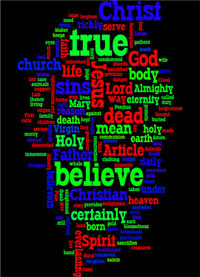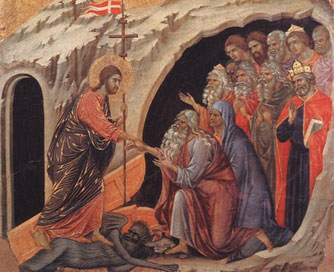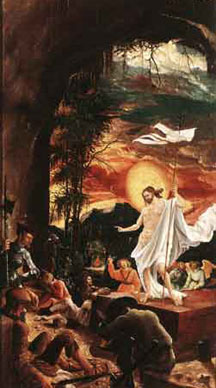
Jesus Razes Hell by Deborah Beach Giordano
A Statement of Faith
 Based on testimonies of faith stretching back to the second century, the Apostles’ Creed is compilation of “things seen and unseen.” In addition to statements about the Lord drawn from the scriptures, it includes other phrases which attempt to convey what belief in “this Jesus” means.
Based on testimonies of faith stretching back to the second century, the Apostles’ Creed is compilation of “things seen and unseen.” In addition to statements about the Lord drawn from the scriptures, it includes other phrases which attempt to convey what belief in “this Jesus” means.
Sadly, the Statement has often been used as a litmus test to separate “true believers” from “heretics,” thus becoming an impediment to faith rather than an avenue for deepening our understanding. And I think that’s a pity.
There are points of disagreement, to be sure; some issues may be interpreted differently between denominations — even between believers, and there is one glaring omission: it doesn’t say what we do because of our belief in Jesus Christ. There is no mention that we follow the example of our Lord; that we understand our calling to be one of compassion, kindness, and service. I think that’s a pity, too.
Let’s Talk
However, allowing for that missing piece, the Apostles’ Creed is a pretty good summary of basic Christian beliefs. And by raising the subjects of forgiveness, the ongoing work of the Holy Spirit, the influence of the faithful — living and dead, judgment, resurrection, and the nature of Christ, it gives us an opportunity to discuss them. In discussing them we can begin to discover what they mean, why these issues came to be included in the Creed, and how they influence our life of faith.
And that’s a very good thing.
Addendum
As I’ve said, most of what we find in the Apostles’ Creed is drawn directly from the Gospels. However, there are some statements with less recognizable pedigrees. One of these, which has inspired a great amount of debate over the years, is “he descended into hell,” in the list of Jesus’s acts and accomplishments.
The Creed declares that, in between his burial and his resurrection, the Lord went down into the place of shades and smoke. But what he did there it leaves unreported.
 The Gospels don’t say anything about how Jesus spent the time between Good Friday and Easter morning. There is no mention of where he was, what he did, or who he was with. The Lord apparently didn’t tell his disciples what went on in the interim, and they didn’t ask. Any speculation would be strictly that: speculation. We simply don’t know.
The Gospels don’t say anything about how Jesus spent the time between Good Friday and Easter morning. There is no mention of where he was, what he did, or who he was with. The Lord apparently didn’t tell his disciples what went on in the interim, and they didn’t ask. Any speculation would be strictly that: speculation. We simply don’t know.
But not-knowing has never kept us humans from giving our opinions — and frequently claiming that these opinions are facts.
Speculation
There are those who say that Jesus’ spirit was with God while his body lay in the tomb; resting, recovering, perhaps reporting on his experiences. That’s the idea I’ve carried with me since my Sunday School days; that after his hard work on earth the Lord took a break in heaven for some well-earned rest and relaxation and Father-Son conversation. It makes sense from a human standpoint: I think we’d all agree that He deserved some down time after all that He had been through.
But the business about Christ going into Hell really intrigues me.
Now the very expression “Christ going to Hell” sounds blasphemous in my ears, and I know I’m not alone in that. Hell — as we usually think of it — is The Place Where Bad People Go. Jesus, that holy, sinless Being, would have no business there. Except….
Except there is a tradition that the Lord did, in fact, go to that Place because he did indeed have business there; the same business he’d been about throughout his earthly ministry, proclaiming the Good News of God’s love.
Interpretation
For Christ suffered for sins once for all, the righteous for the unrighteous, in order to bring you to God. He was put to death in the flesh, but made alive in the spirit, in which he went and made a proclamation to the spirits in prison, who in former times did not obey… This is the reason the gospel was proclaimed even to the dead, so that, though they had been judged in the flesh as everyone is judged, they might live in the spirit as God does.
~ 1 Peter 3:18–20a, 4:6

This Letter has been interpreted to support the belief that, following his burial, Jesus continued to preach the Gospel — to those who had died.
There are those who insist that the Lord did not go into the Hell where the justly condemned suffer. Instead they claim that his ministry was directed to those in Hades or Sheol. This is the land of the dead; a kind of nothingness where (innocent) souls are at rest, existing in a sort of spiritual deep-freeze.
Jesus entered this particular underworld, it is said, to redeem the righteous who had died before the Gospel was revealed. Illustrations dating to the 7th century depict Christ reaching down to pull good folks from their graves: admired ancestors, faithful prophets, pious rulers and — invariably, and always first in line — we see Adam and Eve.
The thing is, not all of these people were exactly what you’d call “righteous.” King David, for example, was a real stinker — deceitful, murderous, unfaithful — yet there he is, featured as a prominent member of the newly-redeemed community. And as for Adam and Eve? Their lying and misconduct was what started all the trouble!

No Picking and Choosing
Medieval theologians envisioned Christ’s visit to Hell as a kind of victory parade. The Lord marched in one door and out the other; the One death could not hold publicly thumbing his nose at the devil, leaving crumbled walls and broken locks in his wake. Behind him the prisoners are emerging from their cells, climbing out from the darkness, slowly but steadily making their way toward the Light, while Satan lies prone and helpless. They are free.
There is no sorting activity, there are no insiders or outsiders, no righteous or wicked, deserving or undeserving, no picking and choosing. Jesus destroys death, as Peter’s Letter puts it, “once for all.” His Gospel was to all the world; his power — God’s power — is greater than all, and extends over all.
Would the One who gave his life for the redemption of present-day sinners have scorned the souls who had stumbled and fallen in the past? Never! Such conduct would be utterly contrary to the Lord Christ’s mission and message.
Wherever he was, whoever he was with, Jesus would have continued to preach the Good News of God’s love and mercy. No one would have been left out.
The Big Picture
Tradition teaches that Christ broke down the gates of Hell and demolished its walls “once for all.” Its power was destroyed. No one can be held captive there ever again. Now nothing can separate us from the love of God — neither death, nor life, nor angels, nor rulers, nor things present, nor things to come, nor powers, nor height, nor depth, nor anything else in all creation.
 Humanity was redeemed through the Lord Christ. All humanity. If Adam and Eve were lifted up, if the cause of the fall was raised, then it is as if it never happened: our divine heritage has been restored to us. The smudge on our character has been erased, and we bear the mark of Jesus’ radiant, grace-filled touch. There is no longer “original sin,” there is original glory, original beauty, original blessing.
Humanity was redeemed through the Lord Christ. All humanity. If Adam and Eve were lifted up, if the cause of the fall was raised, then it is as if it never happened: our divine heritage has been restored to us. The smudge on our character has been erased, and we bear the mark of Jesus’ radiant, grace-filled touch. There is no longer “original sin,” there is original glory, original beauty, original blessing.
And we are called to live accordingly; as a “redeemed people,” embodied expressions of the Good News of God’s boundless love and compassion. Like our Teacher and Guide, our presence should bring relief, comfort, and peace to all those we meet.
Other Hells
In Jesus’ name and through His power we are to seek to lift up those who dwell in the various hells that can plague our human souls. Sickness and sorrow, poverty and greed, anxiety and anger, hatred and fear…. we are more than victors over every temptation and trial and tribulation. They have been vanquished utterly, for Christ broke down the barriers that separate us from God and from one another — once, for all. Our joyful hearts and grateful souls should proclaim that glorious truth in all we say and do, in all we hope for and believe.
Boundless love, compassion and kindness are the greatest testimonies to our faith in Jesus as the Christ. May those gifts shine forth in you.
Virtual hugs and real-time blessings,
Deborah +
This Week's Spiritual Exercises
Are there barriers that prevent you from living fully?
How does your life proclaim God’s goodness and grace?